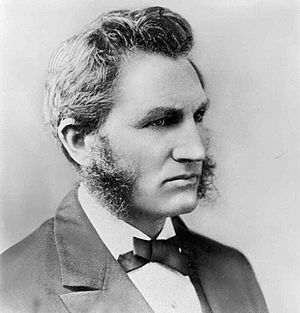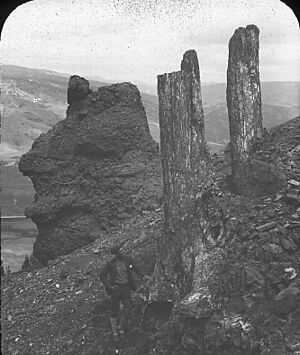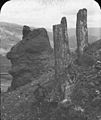Lester Frank Ward facts for kids
Quick facts for kids
Lester Frank Ward
|
|
|---|---|

Lester Ward
|
|
| Born |
Lester Frank Ward
June 18, 1841 |
| Died | April 18, 1913 (aged 71) Washington, D.C.
|
| Resting place | Watertown, New York |
| Nationality | American |
| Alma mater |
|
| Occupation |
|
| Employer | |
| Known for | Paleobotany, Telesis, sociology, and the introduction of sociology as field of higher education |
| Spouse(s) | Elizabeth Carolyn Vought (Lizzie); some sources give Elizabeth Carolyn Bought. |
| Parent(s) |
|
Lester Frank Ward (born June 18, 1841 – died April 18, 1913) was an American botanist, paleontologist, and sociologist. He was the very first president of the American Sociological Association.
Ward was a polymath, meaning he was an expert in many different subjects. He was the first American leader to push for sociology courses to be taught in colleges. He believed that building good social systems could be done using scientific ideas. This idea was popular during the Progressive Era.
Ward's ideas about social science were based on how living things grow and change. He thought society could be guided to improve. He disagreed with thinkers like Herbert Spencer. Spencer believed that society should just "take its own course." Ward, however, thought people could actively guide society for progress.
Like other thinkers such as Thomas Jefferson and Mary Wollstonecraft, Ward believed in strong public education. He thought everyone should have access to knowledge. This knowledge would help people govern themselves well in a democracy.
A collection of Ward's writings and photos is kept at the George Washington University. You can find his articles, diaries, and letters there.
Contents
Biography
Most of what we know about Ward's early life comes from his biography. He once said that he didn't want his life story published while he was alive. He wanted it written after he had passed away, using his diaries and other notes.
Early life and family
Lester Frank Ward was born in Joliet, Illinois. He was the youngest of 10 children. His father, Justus Ward, was a farmer from an old New England family. His mother, Silence Rolph Ward, was educated and loved literature.
When Lester was one year old, his family moved to Cass, now called Downers Grove, Illinois. Later, they moved to St. Charles, Illinois. There, his father built a sawmill business.
Starting school and moving
Ward first went to school in St. Charles when he was nine. He loved books and learning. He read a lot outside of school.
When he was 13, his family moved to Iowa in a covered wagon. Four years later, in 1858, his father died suddenly. Lester and his older brother, Erastus, moved back to their old home in St. Charles. Their mother wanted them to stay in Iowa.
The brothers lived together and worked on the farm. They encouraged each other to get an education. They wanted to avoid a life of hard physical labor.
In late 1858, they moved to Pennsylvania. Their oldest brother, Cyrenus, invited them to help with his wagon wheel business. The younger brothers hoped to save money for college.
The business failed, so Lester found a job teaching. In the summers, he worked on farms. He finally saved enough money to go to college. He enrolled in the Susquehanna Collegiate Institute in 1860. He soon found that his knowledge was very good compared to his classmates.
Marriage and Civil War
While at the Susquehanna Collegiate Institute, Ward met Elizabeth "Lizzie" Carolyn Vought. They fell deeply in love and married on August 13, 1862.
Soon after, Ward joined the Union Army. He fought in the American Civil War and was wounded three times. After the war, he moved to Washington, D.C., and got a job with the government.
Lizzie helped him edit a newsletter called "The Iconoclast." This newsletter supported free thinking. They had a son, but he died when he was less than a year old. Lizzie passed away in 1872. Ward married his second wife, Rosamond Asenath Simons, in 1873.
College and research
After moving to Washington, Ward went to Columbian College. He earned his Bachelor of Arts degree in 1869. In 1871, he got a law degree. He was allowed to practice law in Washington, D.C. In 1873, he completed his Master of Arts degree.
Ward never practiced law. Instead, he focused on research for the government. In 1883, he became a Geologist for the U.S. Geological Survey. He became good friends with John Wesley Powell, who was a powerful director of the Survey.
Professor of Sociology
In 1892, Ward became a Paleontologist for the USGS. He held this job until 1906. Then, he left to become a professor of Sociology at Brown University.
Main ideas and works
In the 1880s, there were many debates about how much democracy society should have. Some, like Herbert Spencer, argued that inequality was natural. He used ideas like Social Darwinism to support this. Ward, however, believed in democracy and equality.
Ward used his scientific knowledge to create an American version of sociology. In 1883, he published a 1,200-page book called Dynamic Sociology. He wanted to use science to help democracy in the United States. Ward believed science should help people. He wrote that the goal of science is to "benefit man."
Spencer's ideas suggested that poverty and inequality were unavoidable. Ward disagreed. He argued that poverty could be reduced or even ended. This could happen through planned actions by society. He believed that humans could control their social systems. They could guide society's development.
Ward's approach is sometimes called telesis. This means society can improve itself through intelligent effort. He thought sociology could help create a fair society. This would include good education for everyone. It would also mean equal opportunities and cooperation. The goal was to promote happiness and freedom for all.
Against "survival of the fittest"
Ward is known for strongly disagreeing with Herbert Spencer. Spencer's ideas of laissez-faire (meaning "let it be" in French) and "survival of the fittest" were very popular. These ideas suggested that the government should not interfere with the economy or society. They believed that only the strongest would succeed.
Ward saw these ideas as harmful. He argued that society needed to actively help people. Historian Henry Steele Commager said that Ward was the first major scholar to challenge these ideas. Ward wanted to create a science of society that would lead to great progress. He believed he first had to fight against the idea of laissez-faire.
Helping those in need
Ward was a strong supporter of the welfare state. This means he believed the government should help people who need it. He strongly criticized those who disagreed with this idea.
Equal rights for women
Ward was a big supporter of equal rights for women. He even wrote that women are naturally better than men. He called his essay "Our Better Halves." Ward used his knowledge of biology to argue against unfair systems that hurt both women and men.
He wrote in 1922 that women have always been important for human progress. He said that without women, men would have made society unbalanced. He believed that women are fully equal to men in intelligence. They deserve equal credit for human progress.
Some historians see Ward as an important feminist writer. He helped bring back feminist ideas that started centuries before him.
Environmental policy
Ward also had a big impact on environmental policy in the United States. This was in the late 1800s and early 1900s. He was seen as one of the thinkers who shaped early American environmental policies.
Views on race
Ward was a Republican and supported ending slavery. He fought in the Civil War for the Union Army. However, some of his early writings contained ideas that would be considered racist today. He sometimes wrote about the superiority of Western culture. He also used outdated terms for Native Americans and Black people.
But Ward lived in Washington D.C., a center for anthropology research. He kept up with new scientific findings. By the early 1900s, his views on race became much more progressive. He was likely influenced by thinkers like W. E. B. Du Bois and Franz Boas.
In the 1870s, as editor of "The Iconoclast", he published articles by Frederick Douglass. He also helped start Howard University, a historically Black university. While many people supported the eugenics movement (a harmful idea about improving the human race through selective breeding), Ward strongly opposed it. His later views on race were very advanced for his time.
Understanding evolution
Ward had a deep understanding of how living things change over time. He believed that environmental factors could influence evolution faster than Darwin's idea of slow change. This idea was sometimes called "Lamarckian" and was criticized.
However, modern science, especially the study of epigenetics, suggests that Ward was partly right. Epigenetics shows that environment can affect how genes work. Ward's work reminds us that scientific understanding can be influenced by powerful groups. But true scientific knowledge, like Ward's, can stand the test of time.
Sociology and progress
Ward believed that conflict and war had driven human progress throughout history. He thought that through conflict, humans became dominant. War also helped advanced groups spread civilization.
However, Ward saw war as a slow and painful process. He believed that human intelligence could create a better system. This new system would bring progress without the suffering of war. He wanted to replace war with a more planned and humane way to achieve progress.
Impact on government
Ward influenced many progressive political leaders. He is sometimes called the "father of the modern welfare state." His ideas helped shape the concept of social liberalism. This idea suggests that government should actively work to improve society.
Ward believed that in large societies, true freedom could only be achieved with a strong democratic government. This government would act in the best interests of everyone. He was confident that sociology could provide the scientific knowledge needed to guide such a government. This would help create a fair and secure society.
Ward's ideas influenced Presidents like Theodore Roosevelt, Woodrow Wilson, Franklin D. Roosevelt, and Lyndon B. Johnson. His thinking helped shape the liberal wing of the modern Democratic Party.
Ward's diaries
Most of Ward's many diaries were reportedly destroyed by his wife after he died. However, his first journal, "Young Ward's Diary", still exists.
Ward died in Washington, D.C. He is buried in Watertown, New York.
Images for kids
See also
 In Spanish: Lester Frank Ward para niños
In Spanish: Lester Frank Ward para niños
- History of feminism
 | Selma Burke |
 | Pauline Powell Burns |
 | Frederick J. Brown |
 | Robert Blackburn |



